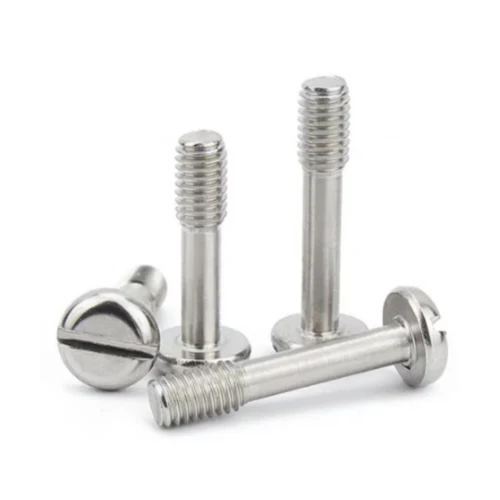Why Are Slotted Screws Still a Popular Choice for Various Applications in Today's Market?
2025-02-20
Slotted screws have been around for centuries, and despite the evolution of fastener technology, they remain a popular choice for many applications. While other types of screws, such as Phillips or Torx, have made their mark in the industry, slotted screws continue to be used in a variety of sectors, from construction to electronics. But why do slotted screws continue to thrive in an age of ever-advancing technology?
What Is a Slotted Screw?
A slotted screw is a type of fastener characterized by a single, straight, horizontal groove on its head, which is designed to be turned using a flat-head screwdriver. Unlike more modern screw types that feature a cross or star-shaped groove, the slotted screw’s simplicity has been its enduring appeal.
Slotted screws are one of the oldest screw designs, dating back to the late 1800s, and they can be found in a wide range of products, from household items to machinery. Their simplicity and cost-effectiveness have kept them relevant, even in an era of advanced manufacturing technologies.
Why Do Slotted Screws Continue to Be Popular?
1. Simplicity and Cost-Effectiveness
One of the main reasons slotted screws are still widely used is their simplicity. They have a straightforward design that requires minimal manufacturing processes, making them inexpensive to produce. Their design is easy to understand and use, making them ideal for both DIY enthusiasts and professionals.
Unlike more complex screw types, such as Phillips or security screws, slotted screws do not require specialized drivers or tools, making them cost-effective for large-scale production. Their low manufacturing cost ensures that they remain a staple in the marketplace, especially for industries and applications that do not require more advanced screw designs.
2. Wide Availability
Slotted screws are widely available in a range of sizes, materials, and finishes. Because of their long history, they are easy to find in most hardware stores, online shops, and industrial supply outlets. Whether you're working on a simple household project or a larger construction or industrial project, slotted screws are typically accessible and easy to obtain.
Additionally, the materials used for slotted screws are varied, from stainless steel to brass and even plastic. This flexibility ensures that they can meet the requirements of different applications, whether you're working in a marine environment, on electronic devices, or with woodwork.
3. Durability and Reliability
Despite their simple design, slotted screws are durable and reliable. They are often used in applications where high precision or torque isn't required, but long-lasting performance is crucial. For example, slotted screws are frequently used in electrical components, cabinetry, and older machinery. They provide a reliable, secure fit that can withstand moderate wear and tear.
Furthermore, slotted screws can be used in a variety of environmental conditions, and their corrosion-resistant properties make them suitable for outdoor applications or industries exposed to humidity, water, or other harsh elements.
4. Ease of Use and Repair
Slotted screws are easy to use, and the tools needed to install them are simple and universally available. Whether you have a basic flat-head screwdriver or a power tool, slotted screws can be driven into materials without requiring specialized equipment. Their straightforward installation process is part of what makes them so accessible for homeowners, hobbyists, and tradespeople alike.
Another benefit is their ease of removal. When it’s time for maintenance, repair, or modification, slotted screws can typically be removed without difficulty. This makes them an ideal choice for applications where screws may need to be undone and reattached multiple times.
5. Versatility in Applications
Slotted screws are extremely versatile. They are used across a wide variety of industries, including automotive, construction, electronics, furniture, and more. From securing panels in machinery to fastening parts in electronics or holding together furniture components, slotted screws are a reliable choice for many tasks.
In fact, their versatility makes them especially popular in older devices or systems where the technology has been around for years. Many vintage and antique products still use slotted screws, ensuring their continued relevance in repair and restoration projects.
6. Security Applications
While not the most secure option available, slotted screws are sometimes preferred in certain security or anti-theft applications. For example, when installing a device that doesn’t require heavy-duty security, a slotted screw can deter tampering without the need for more advanced, complicated fasteners. Slotted screws are often used in applications where the primary concern is ease of access or frequent maintenance, rather than ultimate security.
Are There Any Drawbacks to Slotted Screws?
While slotted screws offer many benefits, they are not without their disadvantages, especially when compared to more modern screw types:
1. Slippage and Stripping
One of the main issues with slotted screws is the tendency for the screwdriver to slip out of the groove, especially when higher torque is applied. This can lead to damage to the screw, the tool, or the material being fastened. In contrast, screw types such as Phillips or Torx are designed to prevent slipping, which makes them more suitable for high-torque applications.
2. Limited Torque Resistance
Slotted screws do not have the same torque resistance as their counterparts like Phillips or Allen screws. If you're working in an application that requires high torque, slotted screws might not be the best choice, as they can become stripped or damaged under heavy use.
3. Less Precision
Slotted screws also provide less precision in terms of driving them. Unlike more advanced screw types, such as security or precision screws, the slotted design doesn’t provide much guidance or control for the driver, which may be a disadvantage in some industrial applications.
Conclusion
So, why are slotted screws still a popular choice for various applications in today’s market? Despite the emergence of more specialized fasteners, slotted screws remain a reliable, cost-effective, and versatile option. Their simplicity, ease of use, and availability have ensured that they continue to be used in a variety of applications, from household projects to large-scale industrial work. While they may not offer the high-torque resistance or security of more modern designs, slotted screws are still an excellent option for many situations, making them a valuable part of the fastener family.



